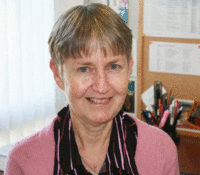Elizabeth Julian RSM
October 2013
Elizabeth Julian RSM
I’m soooo excited! Pope Francis has called for a theology of women. Who would have thought it!
Of course many theologians have already done much work on women’s role in the Church over the past 30-plus years and long and loud have been the calls for ecclesial reform.
Ultimately such a reform means transforming the imagination of Church leaders who have the power to bring about change. To date Francis has acted speedily (for example, in matters of clothing, transport and accommodation) into new ways of thinking so the gospel of Jesus’ love and mercy can be heard by all. I hope that very soon we will see some surprising action (such as his washing of women’s feet) which will transform imaginations and generate new thinking about women’s role. (I’m assuming that women will be involved in the development of such a theology – ‘not about us without us’!).
Women like me are not interested in ordination, but baptism with all its responsibilities and privileges. Baptism is the sacrament of ministry – Cardinal Tom Williams reminded us of this in 1980 – not ordination and it is at our baptism that we are all anointed as priest, prophet and king.
One of the tricky issues is that, at present, decision-making in the Church is linked to ordination rather than baptism. How do we get around that one? So there needs to be a serious theological conversation about baptism, instead of an institutional monologue.
In a genuine conversation the question, rather than the participants, is in control. We don’t know at the start what we may learn because the process itself is uncontrollable.
Everyone involved needs to keep the gospel in view and to listen with humility instead of smugly thinking they are right. (Pope Francis is certainly leading in the humility stakes at the moment.) Participants need to ask how the structures and processes of the institutional Church can best serve the truth of the gospel.
As theologian Timothy Radcliffe said: ‘The Greek word for truth – aletheia – implies the activity of uncovering what is hidden. We must study the Word of God, attend to the teaching of the Church, reflect on the experience of Christians through the centuries and today; we must pray for enlightenment and test our ideas in debate with one another.’
(The Tablet, 2006, 28 January, p.13)
The process is also about (and this is the scary bit) allowing for the possibility that those involved may be wrong – of there being more than one right answer. So what would be some of the elements in a theology of women? My own theological convictions would be held by many in the Church today:
- Jesus came that we may have life and have it to the full (John 10:10).
- The Spirit, the intimate, powerful and creative presence of God, blows where the Spirit wills.
- I am called to live toward the reign of God, Jesus’ dream of justice, peace, love, freedom and equality for all and for the wellbeing of creation.
But a theology of women would involve thinking differently about these elements. Perhaps we could look outside ourselves? In the past the Church has had to learn from the world, rather than teach the world, about issues such as slavery and the language of human right.
The late Old Testament scholar, Carroll Stuhlmueller, showed that Israel adopted from outside leadership institutions such as judge, king, prophet, elder, priest and sage. He wrote in 1978’s Women and Priesthood: Future Directions: ‘At this hour when women have proven their effective leadership in many parts of the secular sphere, the Church is obliged by biblical precedent to open leadership roles to them and to await the wonder and the surprise of such a move.’ (p. 29)
I think we need to be hopeful, not fearful. Theologian Richard Gaillardetz wrote recently in The National Catholic Reporter: ‘Will this pope rewrite controversial church doctrines? No, but that isn’t how doctrine changes. Doctrine changes when pastoral contexts shift and new insights emerge such that particular doctrinal formulations no longer mediate the saving message of God’s transforming love. Doctrine changes when the church has leaders and teachers who are not afraid to take note of new contexts and emerging insights.’
Francis’s focus is mission. Perhaps he’s showing by some of his actions that the mission has a Church rather than the Church having a mission. Perhaps there’s a link between mission and women and leadership that needs to be explored. The Pope said, ‘It is necessary to broaden the opportunities for a stronger presence of women in the church.’
So yes, there are cracks in the stained-glassed ceiling and the light of the gospel is already shining through! Thank you, Pope Francis!
Dr Elizabeth Julian has a DMin from the Chicago Theological Union and teaches at The Catholic Institute in Wellington.